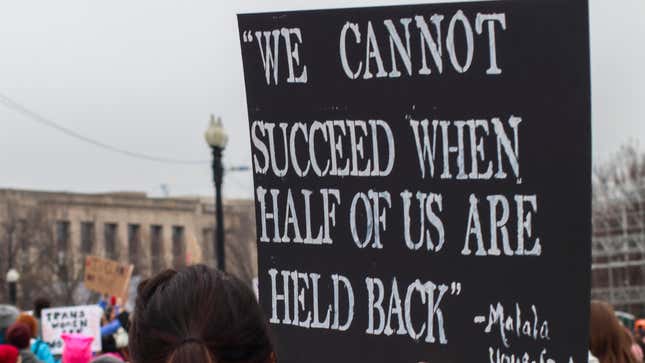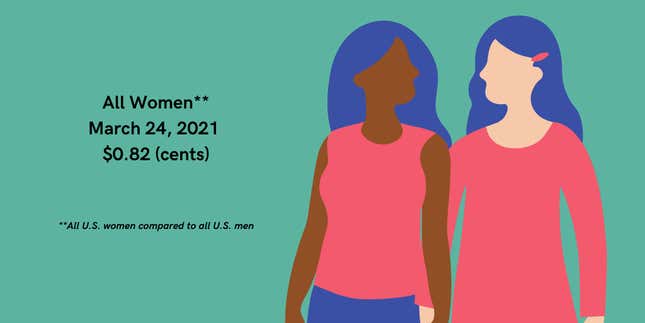
In a year where conversations about equality have largely been centered around race and political equity, it might’ve been easy to forget the ongoing issue of the gender pay gap, even as recent reports have shown that women have been disproportionately affected by the economic fallout of the ongoing pandemic. In fact, an October 2020 report between The Century Foundation and the Center for American Progress revealed that largely due to childcare concerns, women were pushed out of the workforce at four times the rate of their male counterparts over the past year; a statistic that is estimated to potentially set our workforce progress back a generation.
“Mothers will continue to shoulder the majority of family caregiving responsibilities, as they have both historically and thus far in the pandemic,” the report noted, adding: “Mothers of color will be the most affected.”
All of the 140,000 jobs lost last December were held by women. But added to what has been dubbed a “she-cession” (h/t New York Times) are more recent statistics that revealed that Black and Latina women have suffered the highest job losses, with 154,000 Black women dropping out of the workforce in December alone.
“Hard-won progress on closing the gender wage gap may also be set back decades,” the Century Foundation and CAP report continued, noting that women’s labor force participation has “remained virtually stagnant” since the 1990s. “Research has shown that strengthening labor force attachment is critical to increasing women’s earnings,” the report continued. “One study found that women who took just one year out of the workforce had annual earnings that were 39 percent lower than those of women who did not.”
With all of this in mind and in spite of the ongoing global challenges, today, Equal Pay Day actually holds even more resonance than in past years, as even the hard-won strides women have made are once again in jeopardy.
“This year, Equal Pay Day for women falls nearly four months into the year, at a time when women are continuing to bear the worst impact of the pandemic between losing jobs, cut hours, and facing general economic barriers that are gravely impacting their everyday lives,” said Ms. Foundation for Women President and CEO Teresa C. Younger in a statement provided to The Root, adding: “COVID-19 derailed jobs, career plans, and upward mobility for women and we know the impact on wage equality will be significant and long-lasting.”

Glynda C. Carr, president and CEO of Higher Heights for America—the only national organization “exclusively dedicated to harnessing Black women’s political power from the voting booth to elected office”—put an even more sobering perspective on Equal Pay Day as it pertains to Black women:
“On this Equal Pay Day, white women will have worked an additional 83 days in order to match what their male counterparts made by the end of 2020,” she said via a statement, adding a cogent reminder of intersectionality when we consider the current economic crisis. “Black women will have to work until August 3—almost five additional months—to reach this milestone,” she continued. “Over the past year, almost three million women have been driven out of the workforce due to the pandemic, with Black women suffering the worst unemployment level since the crisis began. Black women now face the slowest employment recovery as our nation attempts to get back on track and through the pandemic.”
“We know that Black women and families suffer from inadequate access to affordable, quality health care and childcare, food security challenges and unsafe housing issues at a disproportionately higher rate,” adds In Our Own Voice: National Black Women’s Reproductive Justice Agenda President and CEO Marcela Howell via a statement. “As we work to close the pay gap, we also must address these other disparities. The intersections of oppression are preventing Black women—and all women of color—from accessing the resources and opportunities we need to live the American dream.”
What can be done to close this now-growing chasm faster? Carr believes it necessitates both a tangible acknowledgment of the “centuries-long discrimination” that has impeded the upward mobility, access and personal infrastructures of Black women—who currently make 15% less than white women and 35% less than white men—and a commitment to “expanding Black women’s leadership and representation in our nation’s highest offices.”
“Only with their voices at the tables where policies are introduced, debated and passed, can we move towards a reality where Black women will no longer have to work an extra eight months to earn the same wages as their white male peers,” Carr continued. “Black women, and all workers in America deserve to be paid equally, and ensuring that Black women leaders are elected to office and supported puts us on the path to ensuring that we, as a nation, move closer to realizing the ideals that the American dream is indeed meant and available to us all.”

